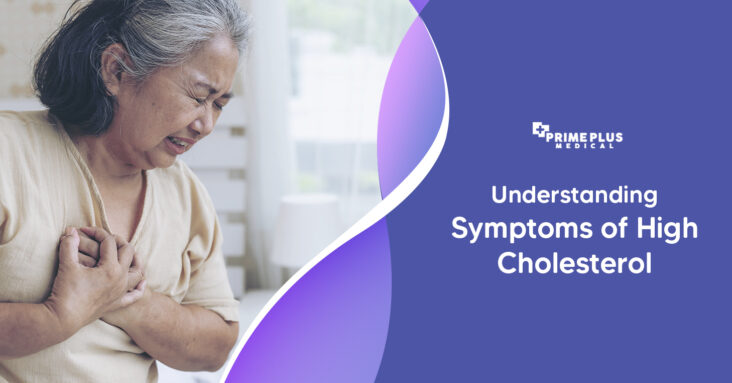Understanding Symptoms of High Cholesterol
High cholesterol is a common health condition that affects millions of people worldwide. It occurs when there is an excessive buildup of cholesterol in the blood, leading to potential health complications. Recognizing the symptoms, understanding the causes, and managing the risks associated with high cholesterol is crucial for maintaining overall health and well-being. This article will discuss the symptoms of high cholesterol, its causes, risk factors, prevention methods, and when it’s necessary to seek medical attention.
Symptoms of High Cholesterol
High cholesterol often does not present any noticeable symptoms, earning it the title of “silent killer.” However, certain signs may indicate high cholesterol levels in the body. These symptoms include:
- Xanthomas: These are fatty deposits that appear as yellowish patches around the eyelids, elbows, knees, or hands.
- Xanthelasmas: Like xanthomas, xanthelasmas are yellowish cholesterol-filled plaques on the eyelids.
- Arcus senilis: A whitish or grayish ring around the cornea of the eye, often associated with high cholesterol levels.
- Chest pain: High cholesterol can contribute to the development of coronary artery disease, leading to chest pain or angina.
- Shortness of breath: When cholesterol buildup restricts blood flow to the heart, it can cause breathing difficulties.
- Numbness or weakness: Reduced blood flow due to high cholesterol can affect peripheral nerves, resulting in numbness or weakness in the limbs.
Causes of High Cholesterol
Understanding the causes of high cholesterol is essential for effective management. The primary contributors to high cholesterol levels include:
- Unhealthy diet: Consuming a diet rich in saturated fats, trans fats, and cholesterol can significantly raise cholesterol levels.
- Lack of physical activity: Leading a sedentary lifestyle can lower high-density lipoprotein (HDL) cholesterol, known as “good cholesterol,” and raise low-density lipoprotein (LDL) cholesterol, known as “bad cholesterol.”
- Obesity: Being overweight or obese increases the risk of developing high cholesterol.
- Genetics: Some individuals may have a genetic predisposition to high cholesterol due to familial hypercholesterolemia.
- Age and gender: Cholesterol levels tend to rise with age, and men are more likely to have higher cholesterol levels than women until menopause.
High Cholesterol Risk Factors
Several factors can increase the risk of developing high cholesterol. These include:
- Family history: Having a family history of high cholesterol or cardiovascular disease can significantly increase the risk.
- Diabetes: Individuals with diabetes often have higher cholesterol levels.
- Smoking: Tobacco smoke damages blood vessels, making it easier for cholesterol to build up.
- Hypertension: High blood pressure can contribute to the development of high cholesterol.
- Metabolic syndrome: This condition includes obesity, high blood pressure, insulin resistance, and abnormal cholesterol levels, all of which increase the risk of cardiovascular disease.
Read More Article Preventing Obesity In Children, Teens, And Adults
High Cholesterol Prevention
Prevention is key when it comes to managing high cholesterol. By making certain lifestyle changes, individuals can effectively reduce their cholesterol levels and maintain good heart health. Here are some prevention strategies:
- Adopt a heart-healthy diet: Focus on consuming a balanced diet rich in fruits, vegetables, whole grains, lean proteins, and healthy fats. Limit the intake of saturated fats, trans fats, and cholesterol-rich foods.
- Engage in regular physical activity: Aim for at least 150 minutes of moderate aerobic exercise or 75 minutes of vigorous exercise per week.
- Maintain a healthy weight: Losing excess weight and maintaining a healthy body mass index (BMI) can significantly lower cholesterol levels.
- Quit smoking: Smoking damages blood vessels and promotes the buildup of cholesterol plaques, increasing the risk of heart disease.
- Limit alcohol consumption: Excessive alcohol intake can lead to high cholesterol levels. Moderate consumption is recommended, with a limit of one drink per day for women and two drinks per day for men.
When to See a Doctor
It is important to have regular check-ups with a healthcare professional to monitor cholesterol levels. A blood test called a lipid profile can measure the amount of cholesterol in the bloodstream. If the results show high cholesterol levels, lifestyle modifications may be recommended initially. However, in some cases, medication may be necessary to manage cholesterol levels effectively. It is crucial to follow the healthcare provider’s guidance and take any prescribed medications as directed.
Managing High Cholesterol? Prime Plus Has You Covered!
High cholesterol is a prevalent condition that can have severe consequences if left untreated. While it does not typically present noticeable symptoms, it significantly increases the risk of developing heart disease and other complications. And if you are not sure about your cholesterol levels, please consult our general practitioner and get yourself checked, as it is an essential part of maintaining your overall health. Our English-speaking team of doctors at Prime Plus Medical in Canggu is ready to assist you 24/7.

